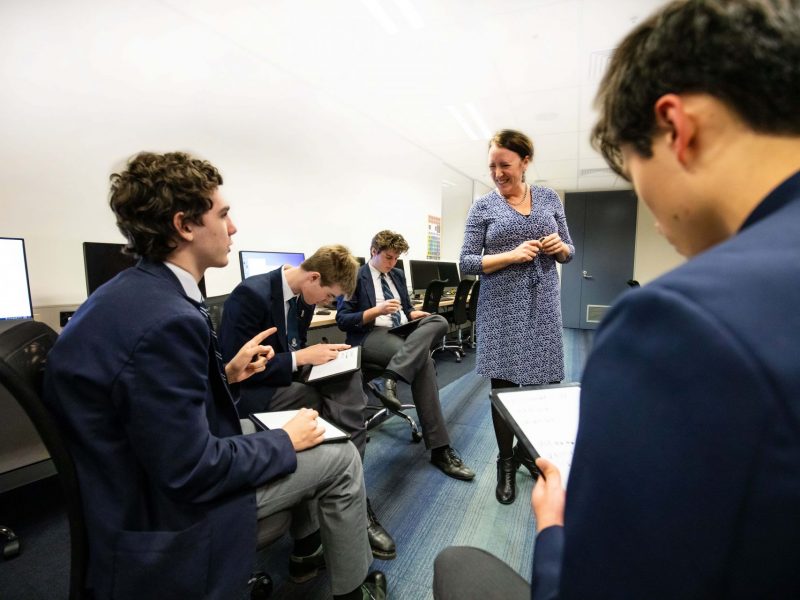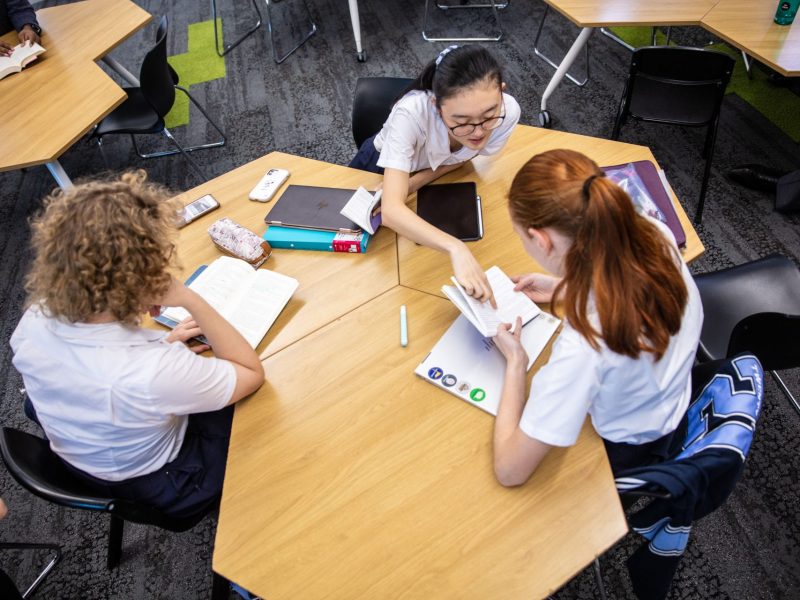One of the School’s greatest strengths is the expertise of our teachers.
Teachers bring with them deep subject knowledge and experience and we continually train and coach them in the craft of the classroom, according to what the evidence tells us brings about the best learning outcomes for children and young people. Teachers set accurate levels of challenge in each lesson that further hone students’ character, enabling them to further rise to each challenge.
One of the school’s greatest strengths is the expertise of our teachers.
Critical to the success of a school is the place of teachers – we value our teachers as experts and masters of their craft, with deep subject and pedagogical knowledge. This is the bedrock of all that we do.
Year 10
Academically, Year 10 completes the student learning of the combined NESA Stage 5 courses and the International Baccalaureate Middle Years Programme. In general, students remain in their classes commenced in Year 9. Subject and learning expectations and approaches are as outlined in the Middle School.
New students to St Andrew’s Cathedral School for Year 10 are guided into appropriate courses depending on their education background of the last few years. Students coming from NSW schools will usually be able to continue with their current subjects. A second language will be studied and students will be guided as to the best choice given previous language experiences, or none. Lack of previous language experience is not an impediment to starting at St Andrew’s Cathedral School in Year 10.
Why is Year 10 in the Senior College?
Year 10 at St Andrew’s Cathedral School is viewed as preparation for the rigours of Years 11 and 12 and also for the beginnings of a focus on what life after school can be. Many of our ex-classroom experiences are created with long-term, not just school focuses.
The opportunity to give detailed attention to subject selection for Years 11 and 12, whilst in Year 10, gives the Senior College staff opportunity to better support students for the remainder of their schooling.
Programmes such as Career Assessment, Outdoor Education (including the life changing 20 day ‘Kosi to Coast’), Community Service (including leadership training and service activities) are all geared toward post-school thinking.
The subject selection process for Years 11 and 12, which happens following the Career Assessment Programme, includes sharing of detailed written course (HSC and IBDP) and subject information, two information evenings for students and parents, availability of staff to discuss selections with students and parents, and individual interviews with the team of Head of House, Course Director of Learning and the Head of Careers and Pathways (to confirm that the selections made are appropriate for the short and long term plans of the student).
New students for Year 11 at St Andrew’s Cathedral School have similar access to this same information, although the information evenings will be recorded information.


Years 11 and 12
Students choose to study the NSW Preliminary and HSC courses or the International Baccalaureate Diploma Programme. Students make this selection during Year 10, and commence learning the courses at the beginning of Year 11.
Teachers of subjects in both these programmes are specialists and many also have experience teaching in both. This adds a richness to the ability of teachers to choose the best of quality pedagogy, often with deeper subject understanding, no matter which classroom they are in.
The student’s use of technology and its application to subject learning is encouraged and pervasive. Students are provided with a school-issued device that has all relevant software loaded for their courses. Teachers use technology extensively in our classrooms.
In Years 11 and 12 there is a significant requirement for students to produce extended pieces of writing for assessment tasks. Academic Honesty is a significant issue in this context; referencing and other techniques are a high priority. Teaching staff and teacher librarians are trained and experienced at assisting students to ensure that their attention to detail is appropriate. Such assistance is provided both in and out of class.
Mentoring and coaching are a regular part of the Senior College experience, mainly but not only facilitated through Tutor Groups. Major projects such as the Extended Essay (IBDP) and the English Extension 2 or Visual Art Major Works (HSC), require subject specialist mentors. A large number of staff are involved in learning coaching methods and are in fact involved in the coaching process for their own professional development.
Students are encouraged to be both independent and collaborative learners. Study spaces reflect this, as do the types of learning experiences both required in syllabuses and by the pedagogical choice of the teacher.
You may be interested in
